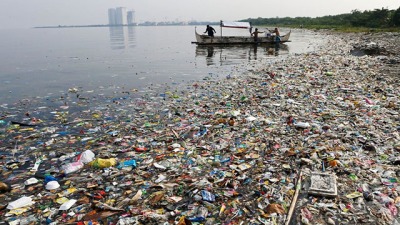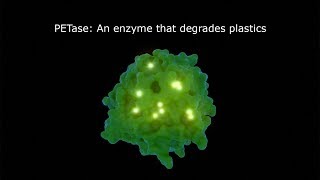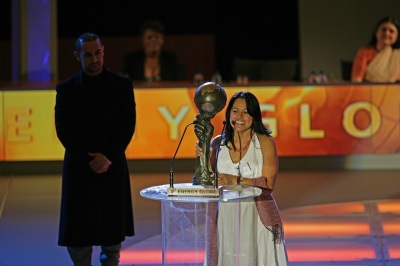Los científicos en Gran Bretaña y los Estados Unidos dicen que han diseñado una enzima que come plástico, un avance que podría ayudar en la lucha contra la contaminación.
La enzima (1) es capaz de digerir tereftalato de polietileno(PET). El PET se vuelve viscoso por encima del 70 ° C. Su punto de fusión está por encima de 250C.
Los científicos han creado, de forma accidental, una enzima mutante que descompone las botellas de bebidas plásticas. Este descubrimiento podría ayudar a resolver la crisis mundial de contaminación por plástico al permitir por primera vez el reciclaje completo de botellas.
La nueva investigación fue impulsada por el descubrimiento en 2016 de la primera bacteria que había evolucionado naturalmente «para comer plástico», en un basurero en Japón. Los científicos ahora han revelado la estructura detallada de la enzima crucial.
La enzima mutante tarda unos días en comenzar a descomponer el plástico, mucho más rápido que los siglos que lleva en los océanos. Pero los investigadores son optimistas de que esto se puede acelerar aún más y convertirse en un proceso viable a gran escala.
Aproximadamente 1 millón de botellas de plástico se venden por minuto en todo el mundo y solo el 14% es reciclado. Muchos plásticos terminan en los océanos donde han contaminado incluso las partes más remotas, dañando la vida marina y potencialmente a las personas que comen mariscos.
Actualmente, aquellas botellas que se reciclan solo pueden convertirse en fibras opacas para la ropa o alfombras. La nueva enzima puede permitir reciclar las botellas de plástico transparente en botellas de plástico transparente, lo que podría reducir la necesidad de producir plástico nuevo.
La estructura de la enzima era muy similar a la desarrollada por muchas bacterias para descomponer la cutina, un polímero natural utilizado como recubrimiento protector por las plantas. Pero cuando el equipo manipuló la enzima para explorar esta conexión, mejoraron accidentalmente su capacidad de comer PET.
Las enzimas industriales son ampliamente utilizadas en, por ejemplo, polvos de lavado y producción de biocombustible. Han sido hechas para trabajar hasta 1,000 veces más rápido en pocos años, la misma escala de tiempo que McGeehan prevé para la enzima que come plástico.
Una posible mejora que se explora es trasplantar la enzima mutante a una «bacteria extremófila» que puede sobrevivir a temperaturas superiores a 70 ° C, momento en el que el PET cambia de un estado vítreo a uno viscoso, lo que hace que se degrade 10-100 veces más rápido.
Trabajos anteriores habían demostrado que algunos hongos pueden descomponer el plástico PET, que representa aproximadamente el 20% de la producción mundial de plástico. Pero las bacterias son mucho más fáciles de aprovechar para usos industriales.
«Las enzimas son no tóxicas, biodegradables y pueden ser producidas en grandes cantidades por microorganismos».
Hasta siempre.
CTsT=CVP
Fuente usada:
* https://www.theguardian.com/environment/2018/apr/16/scientists-accidentally-create-mutant-enzyme-that-eats-plastic-bottles







